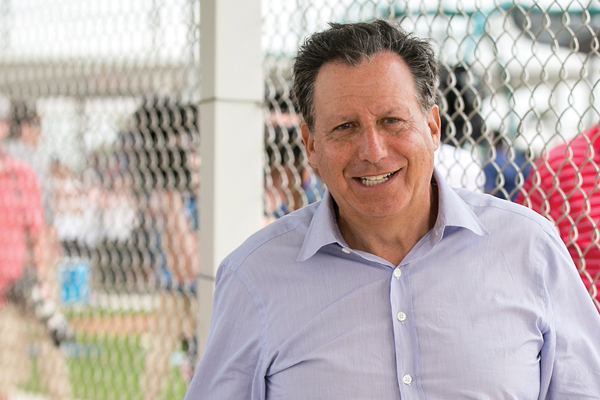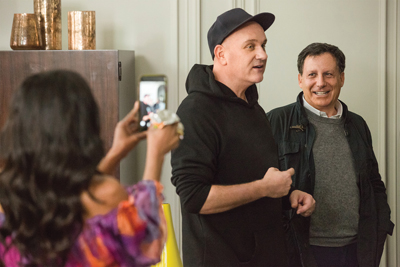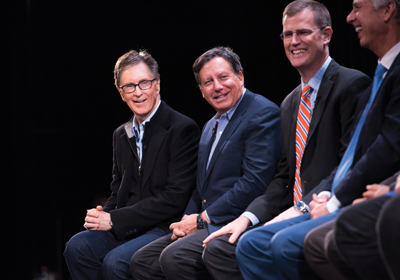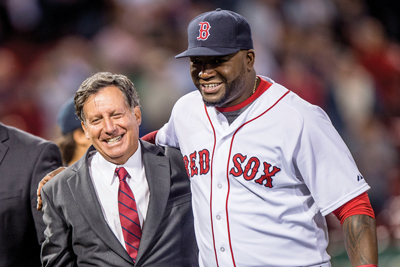 |
From New York to Hollywood to Boston, Tom Werner’s life has kept him moving.
Photo by: GETTY IMAGES |
Tom Werner rubs a napkin against a slice of margherita pizza, dabbing at the cheese and oil. He is deliberate, carefully thinking about the challenges of the sports business.
“Just because the fans were with you yesterday doesn’t mean they are going to be with you today,” he says, taking a sip of a beer.
The two of us are sharing pizzas off trays at Antico, a popular pizza house in Atlanta, talking about fans, specifically the fan base of the Boston Red Sox, the team Werner owns
Catching Up With
Tom Werner
along with majority partner John Henry. But we could have been talking about Liverpool FC, the other franchise in their Fenway Sports Group portfolio, or any fan base for that matter.
“You have to keep moving forward and show fans you care about winning,” he says. “We love to win, and that drives us.”
It’s near the end of a very long day for the 66-year-old Werner, who flew in that morning from California to be on the set of “Survivor’s Remorse,” the Starz show that he co-produces along with LeBron James and others, which starts its third season next month. Throughout the rainy, dreary day, Werner was handling issues related to the start of spring training and Pablo Sandoval’s weight; focusing on script and production details; sharing stories from the wedding of music and film producer Jimmy Iovine, which he attended just days before; and predicting winners of the coming Academy Awards.
Before shooting began after lunch in a large house in the Buckhead region, “Survivor’s Remorse” creator Mike O’Malley dragged Werner into the middle of the room, huddled up the crew and regaled them with tales of Werner’s history in television. Actors and crew shot video on their phones, and O’Malley loudly proclaimed, “This man’s support allows us to do what we do,” holding up the sheepish Werner’s arm to widespread applause.
Werner then retreated off to a side director’s chair during filming, quietly watching. Show director Ali LeRoi and O’Malley frequently looked for Werner’s reaction, but he let the two lead production while offering a nod and encouragement. It would remain this way until he left the set about 7 p.m. to grab dinner, and it started a long stretch for Werner, as he jetted from California to Atlanta to Florida for the start of spring training, then to Boston, Liverpool and back to Boston.
This is the world of Tom Werner, a storyteller behind such hits as “The Cosby Show” and “Roseanne,” an eye for talent who saw Andy Kaufman and Robin Williams in comedy clubs and developed television shows for them, and the steward who has worked with his partners to bring three World Series championships to Red Sox Nation.
It’s a world that continues to evolve, as he works to make baseball relevant to a new generation while bringing new ideas to entertainment, from “Survivor’s Remorse” to his online project with James and Maverick Carter, Uninterrupted. And his world isn’t slowing down.
“I feel I still have my fastball,” he tells me as we finish our pizza and head for a gelato, a period of 24 hours where I observed how sports, entertainment and family drive Werner’s world.
The next morning, Werner waves at me as he finishes up a call, saying, “Have a good day at school, honey.” He catches himself and laughs as he hangs up with one of his daughters — his children are all well out of school — “I must be a little bit out of it this morning!” Werner talks daily to his three children — Teddy is vice president of marketing and business development at the Milwaukee Brewers; Carolyn runs WeViva, a nonprofit that provides affordable fitness and nutrition for low-income families in the Austin, Texas, area; and Amanda is in Boston at event-planning company Hopple Popple.
“I have a fantastic life, and it’s all based around my family. I have three wonderful children and six grandchildren,” he says proudly.
As we settle in, Werner talks of growing up in New York City in the 1950s and the influence it had on his life.
“I spent a lot of my time in Central Park playing sports,” he said, noting that his older brother Peter helped shape his love of sports. “We were always throwing a ball around.”
 |
“Survivor’s Remorse” creator Mike O’Malley praises Werner on the set of the Starz series.
Photo by: STARZ ENTERTAINMENT
|
But it was a renowned New York City saloon that would influence Werner’s love of baseball.
“My best friend’s father owned Toots Shor’s restaurant,” he said. “Everybody in the sports world would hang out there when they came to New York. Toots Shor was a friend of Frank Sinatra and had a great connection with all the athletes. His son Rory and I would just sit in a booth and we would see Mickey Mantle, Willie Mays and all the great athletes at the time.”
He grew up a fan of the Yankees, which leads to one of his stock lines to Red Sox Nation today. “We all made mistakes when we were young,” he says with a laugh.
A strong student who liked to study, Werner left New York City for Harvard.
While he majored in government, he didn’t see a career in politics. Instead, he carried a camera everywhere and started making documentaries. He made one on African-American presidential candidate Shirley Chisholm and on the first documentary filmmaker, Robert Flaherty. He traveled to Israel to make a documentary about life in that country and produced a piece on the local major league ballpark he would later become reconnected with.
When he graduated in 1971, he knew he wanted to remain in storytelling.
“I had two job opportunities,” Werner said. “One was to become a producer at a new show called ‘60 Minutes.’ The other was to go into the research department at ABC. I wanted to see what the other parts of a network were besides a news department. So I started working in the research department at ABC, and that led me to the entertainment position.”
When he arrived at ABC, it was the weakest of the three major networks. But what it may have lacked in programming, it made up for in executive talent.
“I had the privilege of having a number of incredible mentors, who were extraordinary good programmers and people,” Werner recalled. “[Legendary TV executive] Fred Silverman was there. He implored us to take risks. Barry Diller and Michael Eisner were at ABC. You had Roone Arledge running sports, and Bob Iger at sports, as well. It was an amazing time.”
Over a wildly successful run, Werner was a key ingredient behind some of the most successful shows on television, offering a new programming format.
“ABC was not doing very well,” he said. “But the network was very supportive of my first boss and eventual partner Marcy Carsey and I. They were open to new shows, and we started to take some risks and try new elements. ‘Barney Miller’ was very different and that became popular. We got behind ‘Three’s Company’ and created ‘Taxi’ with Jim Brooks and Ed Weinberger.
“You have to keep moving forward and show fans you care about winning. We love to win, and that drives us.”
TOM WERNER
“We’d just sit in these rooms and think about idea after idea. There was such talent; we saw Andy Kaufman and Robin Williams in a comedy club in Los Angeles and knew they were special. We later saw Billy Crystal in New York. We developed a relationship with Garry Marshall, who did ‘Happy Days’ and ‘Mork & Mindy.’ We developed ‘Soap.’ Different, quirky comedies that started to find an audience. They wanted us to develop an hourlong comedy, so we pitched Aaron Spelling on ‘The Love Boat,’ which drew a big audience.”
In his early 30s, life was good for Werner, who was senior vice president of prime time series, and ABC was now the No. 1-ranked network. Carsey left the network in 1979. A year later, married with two kids at the time, Werner joined her in his biggest professional move that friends advised him against.
“I was 33,” he said. “It was a big risk. We didn’t have a lot of money, we were doing deficit financing and working on top of a convenience store. I was nervous, but we were also cocky.”
After a couple of shows didn’t find traction, the two came up with the concept for “The Cosby Show.”
“The network [NBC] didn’t have a lot of faith in it,” Werner remembered. “But the very first episode was not only the No. 1 show in its time period, it was the No. 1 show of the week. Within a few weeks, it was the No. 1 show on television and it stayed that way a number of years.”
While the success of “The Cosby Show” is now overshadowed by the controversy surrounding its main star, it began a run where Carsey/Werner produced such shows as “Roseanne,” “3rd Rock From the Sun,” “Cybill” and many others. Werner’s success in Hollywood is further evident by the respect of his peers. The duo won 24 Emmys and numerous other awards, and earned the Lifetime Achievement Award from the Producers Guild of America in 2001.
Successful in storytelling, Werner saw an opportunity in 1990 to get involved in his first love, baseball.
“The Padres were for sale, and it seemed like a good idea at the time,” he said. “It was only 90 miles down the road from me in Los Angeles. I felt like I could contribute something to the game with my knowledge of the entertainment business.”
In June 1990, Werner and a large group of partners bought the Padres from Joan Kroc for $75 million, and he was installed as general managing partner. But his time there was hardly as successful as his run of television programs — it featured Roseanne Barr’s ugly rendition of the national anthem in July 1990, which drew national ridicule. On the field, the team struggled and ended up trading players and shedding payroll.
For Werner, it was a lesson on the economics of baseball in the 1990s.
“It was a challenging time to be in baseball,” he said. “There was no revenue sharing, and a team like the Yankees, who had their huge media deal with MSG Network, could pay significantly more for players and we really began to see the widening between small and big markets. I didn’t anticipate it would be that way when I got into the game, and it really began to happen over those few years. It just was a tough time.”
It was a short stint for Werner, as his group sold a majority stake in the team to John Moores in 1994 for $80 million.
“Once I got out, I thought I would stay out,” he said. “I love to win, and it wasn’t a level playing field.”
But he followed the game and witnessed the changes off the field under Commissioner Bud Selig.
“There was a time when there were a lot of different agendas in baseball and a lot of friction among owners,” Werner said. “But Bud was able to unify owners and move beyond the tension. He was able to get labor peace and increase the popularity of the game, and get a number of new ballparks. The game seemed to be in a far more healthy place.”
While Werner thought he was out of the baseball business, he was pulled back in by the appeal of buying the Red Sox from the Yawkey Trust in 2001. First, he lined up Larry Lucchino from the Padres to join him and they later got Henry from the Marlins to be the lead investor.
“I will never apologize for wanting to increase revenue, because increasing revenue allows us to have a very competitive team. People talk about the Red Sox and the Yankees in the same breath. The fact is Boston is baseball’s eighth-largest market, but we are No. 2 in total revenue.”
TOM WERNER
The historic significance of the Red Sox struck Werner.
“Someone asked me years ago, ‘If you could in a dream buy the Red Sox or the Yankees, which would you prefer?’ I said, of course, the Red Sox because they had never won a World Series,” he said. “The challenge to win was very important to me.”
The Henry-led group had the winning bid of $600 million, but the reaction from the locals to the out-of-town ownership group was less than warm. After the deal, the Boston Herald ran the headline “Visitors 1, Boston 0.”
“We were deemed as outsiders,” Werner acknowledged. “Now, I had a small connection to Boston with Harvard and making a movie about Fenway Park. But it wasn’t easy at first.”
Fast-forward nearly 15 years and the group’s success is well-known — breaking the curse, three World Series championships over 10 years, the growth of Fenway Sports Group, the acquisition of Liverpool in 2010 and an organization that has been regarded as one of the best run in sports, with a deep bench of young talent and a penchant for risk taking.
But it hasn’t always been easy street and good times; the ownership group also has seen dramatic failures, personnel drama and finished in last place in the AL East in three of the last four years.
“It’s not easy,” Werner acknowledged. “It’s hard to win. We’ve made plenty of mistakes and we’re going to make more. But we have tried to take risks while staying true to a plan that we started when we took over — and that’s a will to win and reinvest. We have always believed very much in reinvesting. We have taken very little money out of the team. We have put more than $300 million into Fenway Park, and that has allowed us to increase our revenue and be able to put that back into the team in payroll or reinvest in the ballpark.”
Learning from his days in San Diego, Werner also focused on revenue generation.
“I will never apologize for wanting to increase revenue, because increasing revenue allows us to have a very competitive team,” he said. “People talk about the Red Sox and the Yankees in the same breath. The fact is Boston is baseball’s eighth-largest market, but we are No. 2 in total revenue, among the top teams in corporate sponsorship, we always are in the top two or three in payroll, and all that is important to us. There is a circle. The more revenue you can create, the more revenue you can invest in your operation. The more competitive your franchise can be, the more revenue you can create. It’s a circle, and I don’t apologize for it.”
On an early February morning at the Red Sox spring training facility in Fort Myers, Fla., Werner walks easily toward the practice fields, telling me, “I’m excited to turn the page from 2015, which was a miserable season.”
He is quickly approached by children and adults seeking autographs and pictures.
“Who is your favorite player?” he asks a young boy, signing his baseball.
“Papi!” the boy exclaims, as his mother gives Werner a thumbs-up and says, “This is our year!”
Werner smiles, “Thanks so much for coming.”
Later he tells another fan, “I’m so honored to be here,” before approaching the beat writers and asking, “How are we looking?”
Werner’s role in the team’s
 |
Tom Werner won over Red Sox Nation with the power of David Ortiz and the leadership of John Henry and Sam Kennedy.
Photos by: BOSTON RED SOX (2)
|
ownership structure is often debated, especially among Boston media, who question his day-to-day impact on the organization. He keeps a low profile and in person can come across as shy. He’s not as mysterious a presence as his lead partner, Henry, who rarely speaks publicly. He was never seen as engaged or demanding as the master operator, Lucchino, who left the team last year and owns its Class AAA affiliate, the Pawtucket Red Sox. Lucchino’s exit has increased the roles of young executives like Sam Kennedy and Jonathan Gilula, among others.
“We had been talking with Larry about a transition for a while,” Werner acknowledged. “His leadership and training developed a very talented group of strong and young executives, most not even in their 40s. They were ready to move up. We felt we were going to lose them, so we needed to keep them motivated, keep them energized and give them more responsibility.”
Talk to those inside Fenway, and the portrait you get of Werner is that of an active idea person who touches all areas of the business.
Ask him about his role and he shrugs nonchalantly.
“I don’t worry about what my role is perceived to be,” he said. “That doesn’t bother me. I know what my role is here. I love what I do and what we’re building. We are on top of things and very engaged; we don’t micromanage, but we know what is going on.”
It’s also clear the respect he has for, and friendship with, the 66-year-old Henry. “I consider John one of my best friends,” Werner said. “We are so close, and our interests are aligned. I realize how fortunate I am to have met John. The partnership has been so fulfilling, and I’m very proud of all that we’ve accomplished together.”
(Talking with Werner last week, he is pleased with the team’s performance this season. The Red Sox led the AL East by three games over the Baltimore Orioles last Wednesday.)
Sitting inside the team’s clubhouse, Werner circles back to the fans.
“Red Sox fans expect us to have a competitive team every year — and that is appropriate — but we’ve always tried to have a long view.”
Ask about any sense of legacy, and Werner talks again of winning. “To continue and win. We are just trying to win more silverware. What we think about all this time is, ‘Did John and I leave the Red Sox, Liverpool and our organizations in a better place?’”
Finishing up, Werner gives off a calm vibe of someone in the right place at the right time — surrounded by two consistent elements in his world: storytelling and sports.
“I have always loved storytelling. I have always loved sports. I understood the influence of sports in culture and the influence of entertainment in culture. I could see the impact both have on society. Today, sports are even more important in culture than entertainment. It’s very exciting for me to be a part of that.”
Abraham D. Madkour can be reached at amadkour@sportsbusinessjournal.com.









